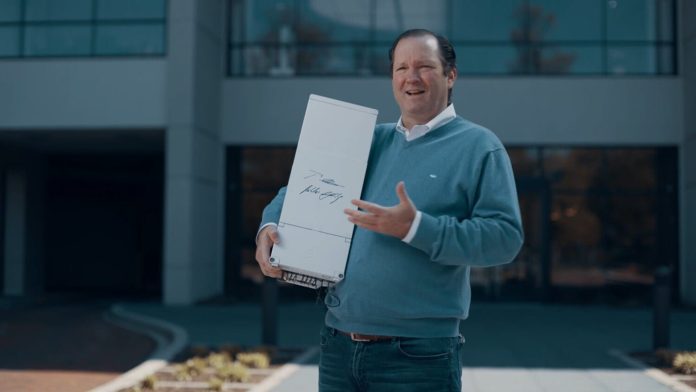Ericsson has revealed the first product off the production line at its new Texas-based 5G-geared smart factory has been delivered, to US operator Verizon. The item, itself, is notable: a millimeter-wave ‘street macro’ solution, presented as “key” to Ericsson’s 5G strategy in North America.
But the subtext looks interesting, too: a cellular vendor making radio gear for critical national infrastructure in the US, pulling together a series of key 2020 socio-economic narratives in the process. The timing is telling: old rival Huawei is being shut out of global markets, one at a time, as the ripple effect of US sanctions threatens to wipe-out a major chunk of 5G business for the China-based vendor.
Meanwhile, Ericsson is piling in, with a ‘made in America’ badge, and a story about industrial revolution. Its new smart factory in Texas is geared to produce 5G-capable radio technology with 5G-enabled production processes. Plus, the first product has gone to Verizon, in New Jersey, without human contact, adhering to guidelines from the Centers for Disease Control and Prevention for social distancing due to COVID-19.
“Verizon [is] the first recipient of a US manufactured commercial 5G base station direct from the factory,” the Swedish vendor stated, simply. But the announcement, which looks rather incidental on one hand, effectively brings together a range of key narratives in 2020, and reveals the loaded role of cellular networking in the current political climate.
In truth, Ericsson’s smart factory in Texas is one component in its global 5G strategy to accelerate supply and demand, and win business from rival vendors, including Huawei. Alongside, the Swedish has completed a SEK 500 million ($52 million) overhaul of its Nanjing factory in China, where it produces LTE (4G) and 5G gear, to create what it claims to be “among the most advanced” manufacturing facilities in the world.
It has an equivalent facility at home, in Europe. These three create a Europe-US-Asia smart-factory axis to accelerate global 5G rollout. Another 5G smart factory, for 5G production of 5G gear, is scheduled to open in Brazil.
The COVID-19 angle has shown the flexibility of its production, says Ericsson. “Due to the impact of COVID-19, in the months prior to opening, the factory was able to leverage virtual reality to provide effective hands-on training for complex operations, thereby increasing efficiency,” it said.
It said in a statement: “Factories powered by 5G dramatically impact data collection, allowing for real-time monitoring of inventory, maintenance needs, higher flexibility and shorter lead times for factory floor production reconfiguration, layout changes and other alterations.
“This domestic manufacturing factory is a critical component of Ericsson’s global supply strategy, bringing manufacturing capabilities to the US as the company works to meet the demand for 5G deployment by bringing the supply chain closer to customers.”
Kyle Malady, chief technology officer of Verizon, said: “Ericsson’s smart factory is a cornerstone of our collaboration as we work together to bring 5G to our consumer, enterprise and public safety customers. Together these types of innovation will accelerate our 5G deployments, as we expand our 5G leadership in technology and continue to rapidly build the ecosystem with our partners.”
Fredrik Jejdling, executive vice president and head of networks at Ericsson, said: “As the most advanced platform for innovation, 5G will enable a transformation across enterprises – as we’re now experiencing in our own smart factories.
“Automation and remote operations have become more important, and we’re working with our customers to make them available for the benefit of industries. From producing the first 5G base stations at our smart factory earlier this year, we’ve made our first commercial delivery to Verizon. That’s just the beginning.”

